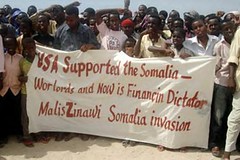
Somalis demonstrate against United States backing of the Ethiopian invasion. The Ethiopian airforce has bombed airstrips in Somalia in an effort to influence events.
Originally uploaded by Pan-African News Wire File Photos
Sunday, March 2, 2008 at 7pm ET
Amnesty International Says Journalists in Somalia Face Deliberate and Systematic Attacks
Journalists Face "Most Dangerous and Difficult Climates Imaginable"
(New York) -- Amnesty International today revealed the brutal extent of repression against Somali journalists trying to report on continuing conflict in the war-torn country, saying all parties have tried to prevent the flow of information about the country by killing, arresting and threatening journalists. The organization said the repression is the worst against Somali journalists since the overthrow of the Siad Barre government in 1991.
Since February 2007, nine Somali journalists have been killed. Death threats and arrests have forced at least 50 journalists to seek refuge in neighboring countries, according to Amnesty International's new report, Somalia: Journalists Under Attack. The National Union of Somali Journalists recorded 53 arrests of journalists in southern and central Somalia and Puntland in 2007.
Journalists who fled the capital of Mogadishu to neighboring countries have told Amnesty International that they regularly received death threats when they reported on casualties suffered by any parties to the conflict. Threats are typically delivered by calls to mobile phones, with the number of the caller withheld, although in many cases the caller has identified himself as an officer of the National Security Agency (NSA) of the Transitional Federal Government (TFG).
"The killings, arrests and death threats targeting Somali journalists are not just another unfortunate by-product of the conflict and general insecurity in Somalia -- they are a deliberate and systematic attempt by all parties to the conflict to stem the flow of information out of the country," said Michelle Kagari, deputy director of Amnesty International's Africa program.
"The voices of Somali journalists providing essential reporting on human rights violations—are being intentionally silenced in one of the most dangerous and difficult climates imaginable. The U.S. government and others wielding influence with Somalia's transitional government and the government of Ethiopia must press them to ensure that all parties to the conflict respect both the physical integrity of reporters and their freedom to report," said Lynn Fredriksson, advocacy director for Africa with Amnesty International USA.
Two journalists told Amnesty International that they received threats personally from Ethiopian diplomatic representatives in Mogadishu. Other journalists told Amnesty International that they received repeated threats from armed groups fighting the TFG and Ethiopian forces. One journalist told Amnesty International: "I wrote a story that two insurgents were killed. I was called on my mobile, and the caller said, "Why did you write that?" I said, "It is the truth. I have to write it." He said, "You are going on the list of those we will kill."
Other journalists have been arrested multiple times by TFG forces or the Ethiopian military. Many identified their captors as members of the NSA, headed by General Mohamed Aden, known as General "Darwish." They were usually detained after having conducted interviews or filed stories about the conflict -- particularly interviews with government opponents.
Some told Amnesty International that while they were being questioned, NSA officers openly discussed among themselves whether or not they should kill the journalists.
Amnesty International called on all governments to provide refuge to Somali journalists forced to flee Somalia, and not to force any journalist to return to the country.
Background information
Ongoing human rights abuses and violations of international humanitarian law by all parties to the conflict -- TFG and Ethiopian forces, and non-governmental armed groups -- in Somalia include rape, beatings, extrajudicial executions, arbitrary detention, torture and indiscriminate attacks on civilian-populated areas.
Some 6,000 civilians are estimated to have been killed in Mogadishu and across southern and central Somalia in 2007, and more than 600,000 newly displaced persons fled violence in the area. Attacks on the media in Somalia mark a reversal in the development of freedom of expression in the country. In 2005 and 2006, new radio and television stations, newspapers and websites opened and news coverage and affiliation had begun to extend beyond clan and warlord loyalties.
Contact: Suzanne Trimel, 212-633-4150
To view the report Somalia: Journalists Under Attack, please visit: http://www.amnesty.org/en/library/info/AFR52/001/2008
No comments:
Post a Comment